Bonnie Lee Bakley
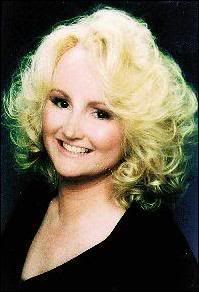
http://en.wikipedia.org/wiki/Bonnie_Lee_Bakley
Early life
Bonny Lee Bakley was born in Morristown, New Jersey to tree surgeon Edward J. Bakley and his wife, Marjorie. She had three other siblings: Margeryy Lois Hall, Joeseph, and her half-brother Peter Carlyon from her mother's second marriage, Peter Carlyon. Problems at home as a teenager led Bonnyto move out of the house and in with her grandmother.
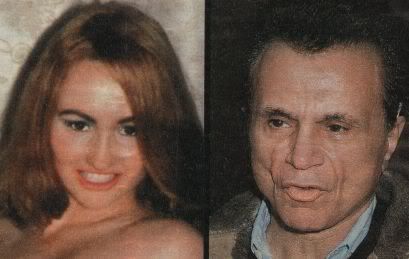
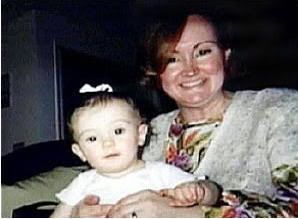
She dropped out of high school at age 16 and decided to go to New York City to pursue a career in modeling and acting at the Barbizon School of Modeling. She was married at 21 to her first cousin and had two children with him.
Bakley's early life is checkered by a criminal record. She was convicted in Little Rock, Arkansas for possessing false identifications. In 1989, she was convicted of drug possession in Memphis, Tennessee and later in 1995, convicted of passing bad checks.
FBI records show that in 1994, while under investigation for fraud, Bakley told agents of a con she ran on a college student, sending her then thirteen year old daughter to seduce the man.
Celebrity Obsession
Bonny soon made a living running a lonely hearts scheme, sending nude pictures of herself (many of which are now available on the internet) to men with the promise of visiting them if they sent her money.
Bakley also had a history of pursuing celebrities. Her friends and relatives all described her as "celebrity-obsessed". She claimed to have had an affair with rock legend Jerry Lee Lewis and borne his daughter in 1993, but DNA tests later disproved her claim. Lewis has denied ever having a relationship with Bakley. Tapes of Bakley's phone conversations reveal that she was starstruck and bent on marrying someone famous. "I like being around celebrities," she once said, "it makes you feel better than other people."
Her lonely hearts fraud, however, continued to be lucrative. She was able to marry several of her victims swindling a number of men out of their savings and life insurance. Eventually she obtained enough money to buy two houses and several undeveloped lots in Memphis and a house outside of LA; additionally, her lonely hearts fraud funded her unsuccessful Hollywood career as a singer and actor under the stage name Leebonny.
Marries Robert Blake
In 1999, Bonny Lee Bakley met Robert Blake at Chuck McCann's birthday party. At the time she was seeing Christian Brando, before becoming acquainted with Blake. Blake slept with Bakley, later claiming that she had assured him that she was taking birth control pills. Friends of Bakley later said that she was, in fact, taking fertility pills at the time. She was soon pregnant with what would be her fourth child.
Initially, Bakley believed that Christian Brando was the father, but later told Blake she wasn't sure, and that it might have been his. When a DNA test determined that it was Blake, not Brando, that was the father of Bakley's youngest child, Blake agreed to marry her. It was his second marriage, her tenth. Their marriage was somewhat unconventional. Bakley lived in a small guest house beside her husband's house in the Studio City area of the San Fernando Valley. It is rumored that Blake only married her to eventually get custody of their child, whom Blake wanted his childless daughter to raise.
On May 4 2001 Blake took Bakley to an Italian dinner at Vitello's Restaurant on Tujunga Boulevard in Studio City. Afterward, Bakley was murdered by a gunshot to the head while sitting in the car, which was parked on a side street around the corner from the restaurant. Blake told the police that he had gone back to the restaurant to get a gun he left at the table and was there when the shooting occurred.
She was buried at Forest Lawn Memorial Park.
Criminal & Civil Suits
On March 16 2005, Blake was found not guilty of the murder of Bonny Lee Bakley, and of one of the two counts of soliciting a former stuntman to murder her. The other count of solicitation was dropped after it was revealed that the jury was deadlocked 11-1 in favor of an acquittal. Los Angeles District Attorney Steve Cooley, commenting on this ruling, called Blake a "miserable human being" and the jurors "incredibly stupid".
Blake's defense team and members of the jury responded that the prosecution had failed to prove its case. During the trial, the defense alleged that Bakley was a drug addict who used her daughter for prostitution.
On November 18 2005, Blake was found liable for the wrongful death of his wife in a civil trial. Bakley's four children sued him, asserting he was responsible for their mother's death. The jury ordered him to pay $30 million.
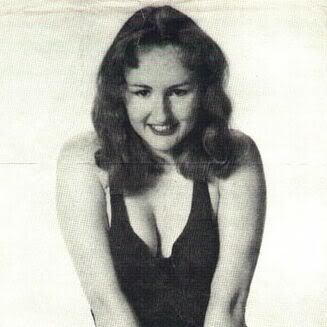
Bonny Lee Bakley
AKA Leebonny Bakley
http://www.nndb.com/people/433/000087172/
AKA Leebonny Bakley
Born: 7-Jun-1956
Birthplace: Morristown, NJ
Died: 4-May-2001
Location of death: Studio City, CA
Cause of death: Murder
Remains: Buried, Forest Lawn Cemetery, Los Angeles, CA
Gender: Female
Race or Ethnicity: White
Sexual orientation: Bisexual
Occupation: Victim
Nationality: United States
Executive summary: Baretta's wife, got whacked
In 1980, still married to her cousin, Bonny moved down south. One day she arrived, uninvited at Jerry Lee's boyhood home. Frankie Jean Lewis, the rocker's sister, says Bonny sashayed into her living room with a tape recorder playing striptease music.
"She takes off her blouse and peels down her stockings," says Frankie. "It was good. She said 'I'd like to meet your brother.' So I got Jerry on the phone and I said 'Jerry, we got us a real live one here.' And he said 'Send her up.' That's what he always said."
Father: Edward J. Bakley (arborist, d. 1973)
Mother: Marjorie Lois Hall
Sister: Margerry Lisa Bakley
Brother: Joseph Bakley
Brother: Peter Carlyon (half brother)
Husband: Evangelos Paulakis (div.)
Husband: Paul Gawron (cousin, m. Nov-1977, div. 1982, 2 children)
Husband: Robert Moon (m. 1984, div. 1987)
Husband: DeMart C. Besly (m. 7-Dec-1988)
Husband: Joseph Brooksher (m. 1992, 1 day)
Husband: William Webber (m. 1993, 2 days)
Husband: E. Robert Telufson (6 weeks)
Husband: Glynn H. Wolfe
Husband: John Ray (m. 1996, div. 1998)
Husband: Robert Blake (m. 19-Nov-2000)
Daughter: Holly Lee Gawron (b. 1981, with Paul)
Son: Glenn Paul Gawron (with Paul)
Daughter: Jeri Lee Lewis (b. 28-Jul-1993, with Lewis)
Daughter: Christian Shannon Brando (renamed Rose Lenore Sophia Blake, b. 2-Jun-2000)
Boyfriend: Jerry Lee Lewis
Boyfriend: Christian Brando
High School: (dropped out, age 16)
Drug Possession Memphis, TN 1989
Passing Bad Checks TN 1995
Shot Studio City, CA (4-May-2001)
Who Was Bonny Lee Bakley?
The 44-year-old Bakley, who went by several aliases, had been married numerous times - so many in fact, that several of her former husbands don't know how many marriages she's had or whether she was even divorced when she remarried.
http://www.francesfarmersrevenge.com/stuff/archive/beretta/
She also made a living running a lonely hearts scheme, sending provocative pictures of herself to men with the promise of visiting them if they sent her money. After receiving money, she would never show.
By the time she died she had accumulated an estate that included three houses.
Bakley's past was further checkered by a criminal record. She had been convicted in Arkansas for possessing false identifications.
Bakley also had a history of pursuing celebrities. She claimed to have had an affair with rock legend Jerry Lee Lewis and borne his child, a girl she named Jeri Lee, but DNA tests later proved he was not the father. Lewis has denied having a relationship with Bakley.
Tapes of Bakley's phone conversations reveal that she was starstruck and bent on marrying someone famous.
"I like being around celebrities," she said on one tape. "It makes you feel better than other people."
Initially, Bakley believed the her fourth child, a baby girl, was fathered by Christian Brando, son of Marlon Brando. Bakley claimed to have become involved with him after he was released from prison after serving half of a 10-year sentenced for manslaughter for killing his half-sister's boyfriend in 1990.
She named her daughter Christian Shannon Brando, but later told Blake she wasn't sure if the baby was Brando's. When a DNA test determined that it was Blake, not Brando, that was the father of Bakley's youngest child, Blake agreed to marry her.
On the evening of May 4, 2001, actor Robert Blake (Baretta, In Cold Blood) and his wife, Bonny Lee Bakley, ate dinner at an Italian restaurant in the Studio City section of Los Angeles, Vitellos. Afterward, according to Blake, the couple walked the block and a half to their car, whereupon Blake realized he'd left his gun inside the restaurant -- a gun he was carrying because Bakley believed her life was in danger. Blake left Bakley in the car and walked back to the restaurant.Nobody in the restaurant remembers Blake actually retrieving anything: He apparently drank a glass of water and returned to his car where he discovered Bakley had been shot to death.
Suspicion quickly pointed to Blake and, just as quickly, his lawyer, Harland Braun, began to spin the story to emphasize Bakley's somewhat sordid past (she could most charitably be referred to as a con artist), suggesting that any number of people had reason to have wanted her dead, for just as many different reasons. The marriage itself, though, had been described as "troubled" -- Blake only married Bakley because she was pregnant with his child and according to some acquaintances, the couple rarely went out to eat together.
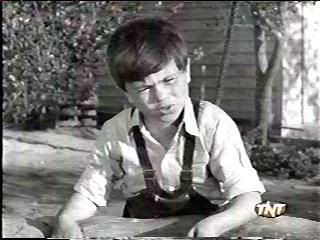
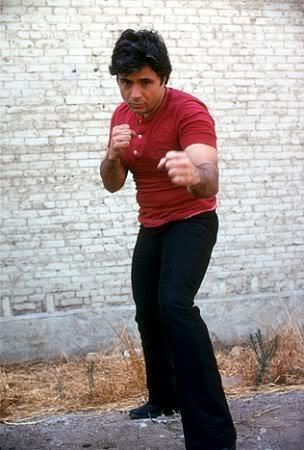
Robert Blake, Actor / Murder Suspect
Born: 18 September 1933
Birthplace: Nutley, New Jersey
Best Known As: The Baretta star who was accused of killing his wife
http://www.answers.com/topic/robert-blake-actor-murder-suspect
Name at birth: Michael James Vijencio Gubitosi
An actor who once played a cop on TV, Blake was charged in 2002 with the shooting death of his wife, Bonny Lee Bakley. As a child actor Blake appeared in the Our Gang movie series; as an adult his specialty was hard-bitten heroes with soft hearts, particularly the cockatoo-carrying, disguise-wearing TV detective Baretta (1975-78). Blake and Bakley were married in November of 2000 after paternity tests proved he was the father of her infant daughter Rose. On 4 May 2001 Bakley was shot and killed while sitting in a car near Vitello's Restaurant in Studio City after having dinner with Blake. After an investigation of nearly a year, Blake was arrested and charged with murder. (His bodyguard Earle Caldwell also was arrested and charged with conspiracy.) Police alleged that Blake had shot Bakley himself after trying to hire others to do the killing. After many procedural delays, Blake's trial took place in 2005; the jury deliberated for nine days before ruling Blake not guilty of the murder charge. Later that same year, a civil suit was brought against Blake by the children of Bakley; Blake was found responsible for Bakley's death and ordered to pay a reported $30 million to her children.
Blake won a 1975 Emmy for his portrayal of Tony Baretta... He played labor kingpin Jimmy Hoffa in the 1983 TV movie Blood Feud... The Baretta theme song ("Don't do the crime if you can't do the time...") was sung by Sammy Davis, Jr.... Prior to her relationship with Blake, Bakley was romantically involved with Christian Brando, son of actor Marlon Brando.
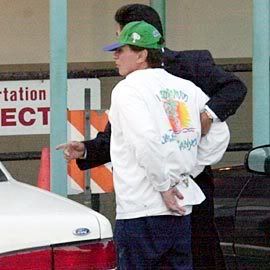
April 18, 2002 Actor Robert Blake was arrested by Los Angeles police today, nearly a year after his wife was shot to death in the couple's car.
http://www.absolutenow.com/mugshots/robert_blake.html
The actor was arrested at his sister's home in Hidden Hills at about 6 p.m. PT.
'We are confirming that we have arrested Robert Blake in connection with the murder of his wife,' police spokesman Officer Don Cox said. He said that Earle Caldwell, Blake's chauffeur and bodyguard, was also taken into custody. Blake was taken to Parker Center police headquarters. His hands cuffed behind his back and wearing a white jacket and a green cap, he was escorted out of a white unmarked squad car and into the building, where he was booked and had his fingerprints and mugshot taken.
Bonny Lee Bakley, 44, was shot to death May 4 last year as she sat in Blake's car after they ate dinner at the restaurant Vitello's. Blake, 68, told police they walked to the car together but he had to return to the restaurant to retrieve a gun he had left behind. When he returned, Bakley was dead, he said.
Police arrived outside Blake's sister's home hours before they arrested him. For nearly a year, police seemed stymied as no witnesses stepped forward and a lack of evidence stalled the case.
Police insisted the investigation was not dead, and it apparently bore fruit today.
Sandi Gibbons, spokeswoman for the Los Angeles district attorney, said prosecutors will review the case submitted by police, and on Monday will announce whether they intend to file charges. Arraignment would be that day in Van Nuys Superior Court, she said.
Fingers Point at Blake
Blake denied involvement in Bakley's slaying, but Los Angeles police repeatedly said they had not ruled out the former Baretta star or anyone as a suspect.
Bakley's family — particularly her mother, sister, and grown daughter — have said they believe he was involved in the slaying, and cited alleged abuse and threats made by Blake.
Ten days after the killing, police recovered what they believed was the weapon used when they found a gun in a trash bin a block-and-half away from the crime scene.
The gun, a Walther pistol described as a collector's item, still had one bullet, which matched the two bullets used to kill Bakley. A source close to the investigation told ABCNEWS at the time that police found a box of ammunition of the same brand in Blake's house. Three bullets were missing from the box, the source said.
Blake's defenders pointed out he is avid gun collector, and the brand of ammunition, Remington Peters, is a popular brand.
Bakley's autopsy report has been sealed because detectives believed the investigation would be compromised.
The Victim's Alleged Past
Harland Braun, Blake's attorney, has painted an unsympathetic picture of Bakley since the beginning of the investigation, portraying her as a lifelong grifter who was obsessed with being a celebrity's wife.
Bakley's shady past, he said, ultimately led to her death. He released tapes of Bakley's phone conversations made before her marriage to Blake, where she seemed torn between pursuing Blake or Marlon Brando's son Christian. He has also submitted boxes of tapes, letters, photos and other documents to police to suggest that Bakley defrauded several people, giving them a motive for killing her.
Blake remained somewhat reclusive since the slaying. Representatives at Vitello's restaurant said they had rarely seen him there since the slaying. Noting that they were busy serving customers, a Vitello's employee said tonight they had no comment on Blake's arrest at this time.
Blake has been raising Rose, the baby daughter he had with Bakley, occasionally leaving his home in the Studio City and according to his attorney, and receiving letters of support.
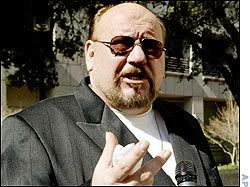
Ex-mobster: Robert Blake 'wanted to annihilate' his wife
Reformed gangster Frank Minucci told jurors Tuesday that actor Robert Blake sought his help to kill Bonny Lee Bakley. http://www.courttv.com/trials/blake/020805_ctv.html
By Lisa Sweetingham
Court TV
VAN NUYS, Calif. — When Robert Blake faced the prospect of life with Bonny Lee Bakley, he called a friend in New Jersey who used to run around with mobsters and made him an offer the actor hoped he couldn't refuse.
"He said he's got something really heavy for me to do. He said he would give me a blank, signed check," Frank Minucci testified in Blake's murder trial Tuesday. "He was screaming about a woman. He said, 'She's got me by the balls.'"
Minucci, a self-described minister and actor who played a mob boss in the film "Carlito's Way," told jurors that Blake offered him any amount of money if he would just come to California.
"He said, 'I want the guy in 'Carlito's Way' — that's the guy I want,'" Minucci testified.
He said when Blake mentioned that the woman, whom he never named, was pregnant and claiming the baby was his, Minucci suggested he marry her.
"He said he wanted to annihilate the bitch: 'I'll kill both her and the kid,'" Minucci said. "That was at the time he didn't know [the baby] was his."
Minucci said that when he told Blake, "What are you talking about, Bobby? You want me to whack somebody? 'Cause I ain't that guy," the actor became angry, said he didn't want to talk on the phone, and again pleaded with Minucci to come to California.
Some time later, they spoke again by phone and the actor allegedly told Minucci, "You f---, now I got to marry the bitch."
"He told me he was getting married and after the situation had settled, my wife and me should come out to California and we would talk about things when I got there. But I never went," the witness testified.
Minucci's testimony dealt another blow to the defense and came on the heels of witness Gary McLarty, a stuntman who testified that Blake offered him money and insinuated how to murder his wife several weeks before her death, but never mentioned Bakley by name.
Stuntman Ronald "Duffy" Hambleton is expected to testify Wednesday that Blake solicited him with a similar murder-for-hire offer.
Prosecutors say that when Blake couldn't hire anyone to kill Bakley, he pulled the trigger himself on May 4, 2001 as she sat in his parked car near an Italian restaurant where they had just finished their last meal together.
Blake claims that while he may not have loved his wife of six months, he did not wish her dead, and he had nothing to do with her shooting.
Phone friends
Minucci, a broad-shouldered, slightly rotund figure in a black suit, eyeglasses and goatee, spoke from the hip as he described his former profession.
"I was a street guy, I ran numbers, loan-sharking, ran after-hours joints — a lot of bad-guy stuff," he said.
Minucci told jurors that after he met his wife, had a baby, and gave his "life to the Lord," there was "no more bad-guy stuff."
"Brother Frank: A True Story" is a biography about Minucci's transcendence from street thug to ministry figure and actor.
Minucci told jurors that Blake contacted him through his agent in late 1998 or early 1999 and the two began a phone relationship for the next year and a half, talking about their similar abusive childhoods and trading "war stories."
"He talked to me a lot about problems he was having. Sometimes he was just depressed. He hated Hollywood," Minucci testified. "At one point, he told me he had been on the psychiatric couch for 35 years and it wasn't doing him any good."
Minucci said that at times Blake sounded agitated and "fired up," but other times his speech was slurred and he sounded medicated.
"Did he talk to you about women?" prosecutor Shellie Samuels asked.
"They were to be used," Minucci said.
The prosecutor asked him to elaborate and told him it was acceptable to use profanity in the courtroom. Minucci, however, looked up and said he had to answer to someone else for his language.
"I can't remember his exact words, but it was filthy, for filthy reasons," he said.
Minucci said Blake once talked about a woman in New York with whom he had a difficult relationship, because she "had his nose open."
Minucci explained to jurors that Blake was madly in love with the woman because of her sexual prowess.
Threatening calls
Minucci testified that about this time he received five $100 bills in an envelope mailed from California with no note and no explanation.
"I called Bobby. He said, 'I'm sending you a little something else,'" the witness testified. A second envelope, with another $500, followed, and then a request from Blake.
"He said, 'Get her to change her number. I don't care how you do it, scare her — whatever you want to do," Minucci testified.
Prosecutor Samuels later asked Minucci if he had heard of a woman named Colette Duvall, a former girlfriend of Blake's, however Minucci didn't recognize her name and testified that he was only given the New York woman's phone and address.
Minucci said he and a man from his past named "Cockeye Ralphie," went to a pay phone in Staten Island to call the woman.
On cross-examination, Minucci told Blake's defense he didn't know Ralphie's last name.
"I don't know. And that's my answer — I don't know. There's a lot of us, we don't ask names," Minucci deadpanned like a character out of "The Sopranos."
Minucci said Ralphie made the first threatening call.
"He told her he was going to rip her laundry off and do dirty things to her," Minucci testified. "She asked him when he was coming over."
Minucci said he didn't believe Ralphie, so he called her himself.
"She wanted to know how big it was," Minucci said, smiling and shrugging in embarrassment.
"How big what was?" Samuels asked.
"My hooza-whatzi," the witness said.
The courtroom erupted in laughter and the witness smiled. Blake sat still at the defense table and did not laugh.
Minucci said Blake called him shortly after the failed phone calls.
"He said, 'I don't want you to call her no more, leave her alone.'" Minucci testified. "He was really fired up. I started feeling like he was my boss."
Bakley's voice
On cross-examination, Minucci admitted that he was a minister and was "wearing a collar" at the time he threatened the woman in New York.
He also said that Blake complained about a lot of people in his life, often using profanities, and that one would need "a roll of toilet paper" to list all the people Blake wanted to "whack" from his childhood to the present.
Although Minucci mostly kept his composure on the stand, he appeared to have trouble understanding when he could speak and when objections to questions prohibited him from answering.
"I don't have a Harvard degree, your honor," Minucci told the judge. "So you got to help me out here."
At one point, defense attorney Gerald Schwartzbach cut off the witness when he attempted to give an elaborate answer to a yes or no question, and Minucci shot back, "No, there'll be none of that. You ask me a question, I want to give an answer."
Minucci also seemed confused about whether the woman in New York whom Blake sent him cash in the mail to deal with was the same woman Blake was complaining about when he asked Minucci to travel to California.
In a police interview a year after Bakley's murder, Minucci told detectives that he called Blake's house in the spring of 2000, that a woman answered the phone whom he instantly recognized as the woman in New York, and he assumed later that it was Bakley.
"She had that smooth, sexy kind of voice. You know what I mean? Like she was putting it on," he testified.
Blake, however, did not marry Bakley until November 2000, and she lived in his home for less than a week before she was murdered.
"The fact of the matter, sir, is that the last time you spoke to him, he told you he was going to retire with that woman, isn't that correct?" Schwartzbach asked the witness.
"Either that or retire her," Minucci shot back.
The answer was stricken from the record.
Outside the courtroom, reporters asked Minucci if he believed Blake murdered his wife.
"Do I think he did it? I wasn't there, brother, but if I had to put my money on a horse, it would definitely be 'He Did It.' There's no doubt in my heart," Minucci said. "And that's a sad thing to say from an old gangster like me. I'm almost in tears here, because I really hate being here. The guy's a dirtbag. Bottom line, you don't kill the mother of your children."
Robert Blake, 71, faces life in prison if convicted of the murder of Bonny Lee Bakley.
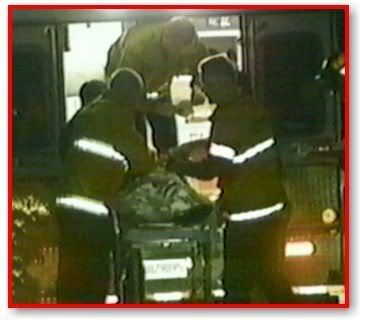
In letter, Robert Blake's wife mentioned brushes with death
http://news.findlaw.com/court_tv/s/20051019/19oct2005120337.html
By Lisa Sweetingham, Court TV
BURBANK, Calif. (Court TV) — Shortly after his wife was gunned down by an unknown assailant, Robert Blake says he looked through a trunk filled with her belongings and found a letter she had written her probation officer years earlier in which she boasted about a half-dozen times she had escaped death.
"I was brought up dirt poor and always had the dream to either become famous ... or to marry someone who already is as famous as I wanted to be," Bonny Lee Bakley wrote in a letter, which was projected on a screen for jurors at Blake's civil trial Tuesday. "And this is why I'm driven. Also, being I've almost been killed a half dozen times, I know I better not waste any time."
The actor's defense said the letter was likely written in 1999, when Bakley was pregnant with Blake's child and on federal probation in Arkansas for fraud charges.
Bakley was trying to convince Blake to marry her at the time, but was also dating the son of actor Marlon Brando, whom she met while he was in prison for killing his sister's boyfriend.
"Keep in mind also, that if I should lose out on Blake because of this distance," Bakley's letter continued, "then after I'm off probation I will most likely end up with Christian Brando, whom I cared about before I met Blake. And we all know how unstable he is."
Brando has been listed as a witness by Blake's defense and he may be called to the stand when the defense begins its case next week.
Blake, 72, was acquitted of murder charges in March and is now defending himself against a wrongful death civil suit brought against him by Bakley's four surviving children.
"Mr. Blake, did you have anything at all to do with Miss Bakley's death?" attorney Peter Ezzell asked his client.
"No," Blake said.
"I have no further questions, your honor," Ezzell concluded.
The "Baretta" star has maintained his innocence through six days of contentious and often confusing questions about the events that transpired more than four years ago when his wife was shot to death outside an Italian restaurant in Studio City.
The diminutive, gray-haired actor's bravado on the witness stand has caused jurors to laugh out loud, shake their heads and whisper to one another.
Blake has been known to call plaintiff's attorney Eric Dubin "chief" and "liar." When he speaks out of turn, he often whispers to himself, "Shut up, Robert."
Blake has steadfastly maintained his innocence, but his mood alternates from short-fused and confrontational when asked about his curious decisions on the night of his wife's death, to warm and reminiscent when discussing his love for Rosie, the 5-year-old daughter he shared with Bakley.
Bakley's two adult children, Holly and Glenn Gawron, have sat stone-faced at the plaintiff's table through more than a month of often wrenching testimony about Bakley's fitness as a mother, her schemes to trick Blake into marrying her, and her successful mail-order porn business that she also used to scam cash from lonely men.
The defense contends that many of those men had motive to kill Bakley.
Jurors voice their doubts
As the case against Blake begins to wind down, some jurors appear to be concerned about Blake's credibility, based on questions they posed Tuesday.
If he was truly trying to help his wife, one juror wanted to know, why did Blake waste time knocking on doors after he found Bakley bloody and unresponsive in the passenger seat of his car, instead of running straight back to the restaurant where they had just finished dinner?
Jurors may submit written questions, which, if approved by the judge, are slipped seamlessly into the attorney's questions in such a way that panel members do not know it's a query from one of their own.
"I don't know, I suppose everybody does it differently," Blake explained. "I looked up and saw there were [porch] lights and I went to the closest place where I thought there were people."
Another juror asked Blake about a claim he made in court Monday about a strange man he nicknamed "Buzz Cut" who had been parked in front of his home in the weeks before Bakley was killed.
"If Mr. Blake was concerned about Buzz Cut, why didn't he write the license plate numbers down and have it checked out? I'm sure he knew someone who could do him a favor?" the juror asked.
Blake said Buzz Cut never stayed put long enough for him to jot down the plates.
Another juror wanted to know why Blake didn't use the level of anger he has expressed during the trial to demand to be allowed near his wife at the crime scene. Witnesses have testified that Blake never approached his wife while paramedics tried to save her.
"She deserved at least a 'good-bye, toots,'" the juror wrote, calling on the hard-boiled language Blake has used on the stand.
The actor responded that he tried to go to her side several times but was led away.
"Did you kill your wife?" Dubin asked Blake point-blank.
"I beg your pardon, sir?" Blake said.
"Did you kill your wife?" Dubin repeated the question.
"No," Blake said, warning Dubin, "Don't get cute."
Blake said he had affection and warmth for Bakley, but was not in love with her.
He married her, he said, to make a safe home for Rosie. At the time of Bakley's death, Blake said, he loved her the way one loves a pet, the desert or the ocean.
"I suppose poets have written sonnets for a thousand years about being in love. A lot of people say, 'I love my husband, I love my wife,' but I believe they really mean they're in love with their husband or wife, which is quite different from loving your dog," Blake explained. "I loved her. I thought she was charming. I respected her intellect ... She could get a rock to follow her down the road. She was captivating. But there was a terrifying side to her that you would never want to rouse. Hopefully, it could be dampened and eased as she had a better life for the first time in her life."
Bakley was shot twice on May 4, 2001, just days after she moved to California to live in Blake's guest house and begin their new life together.
Blake will return to the stand Wednesday morning to complete a seventh day of testimony.

Robert Blake Not Guilty
http://crime.about.com/od/news/a/blake050316.htm
RobertBlakeTrialVerdict
http://video.yahoo.com/video/play?vid=1097354313
Jury Deadlocks on Solicitation Charge
"Not Guilty" and that's the name of that tune.
A jury of seven women and five men deliberated for more than 36 hours before returning a verdict of not guilty in the murder of his wife, Bonny Lee Bakley and not guilty on one count of soliciting someone to murder her. The jury deadlocked on a second solicitation charge.
The jury was deadlocked 11-1 for not guilty on the second charge. The prosecution has agreed to drop the solicitation charge rather than retry the case. Jurors told reporters they found Blake not guilty because the prosecution's evidence never "put the gun in his hand."
The 71-year-old actor was accused of shooting Bakley, his wife of only six months, outside his favorite Studio City restaurant Vitello's after trying many other options to get her out of the life of their infant daughter Rosie.
According to the prosecution, Blake was obsessed with keeping Bakley out of his daughter's life, due to her long history of sexual and criminal activity bilking men out of money through a lonely hearts mail-order scam. The prosecution said Blake first tried to abduct Rosie, tried to get Bakley's probation revoked by planting drugs on her, tried to get others to "whack" her, and finally shot her himself when everything else failed.
Bakley was on probation for mail fraud at the time that she died. She had bilked hundreds of men out of money with her mail-order scam and even married some of them and had their adult children cut out of her victim's wills. She also had a history of pursuing celebrities. The defense argued that there were hundreds of people with a motive to kill Bakley.
Blake told an interviewer that he believed after he and Bakley got married, someone recognized her photo in the press and began to stalk her. He said Bakley was concerned about former victims -- she had received threatening letters from some of them -- and that is the reason he carried a gun for protection and hired a bodyguard at one point. A former maid of Blake testified to seeing a stranger in a vehicle parked near Blake's house in the day leading up to the shooting.

Deadly Night at Vitello's
On May 4, 2001, Blake and Bakley went to Vitello's restaurant for dinner. After they left, Blake returned to the restaurant to retrieve his handgun, which he had left in the restaurant booth. He asked for water and after drinking two glasses, he left again. When he returned to the car he found Bakley had been shot, he said. He ran to the nearby home of Sean Stanek, who called 911 and returned to the scene with Blake. Stanek tried to stop Bakley's bleeding while Blake sat on the curb crying.
Bakley was pronounced dead at St. Joseph's hospital.
Several days after the shooting a vintage World War II Walther PPK was found with its serial number partially filed off in the Dumpster near where Blake's car was parked and proved to be the murder weapon. The handgun Blake retrieved from the restaurant was not the murder weapon, test revealed.
Note: One of the signature lines "Baretta" used in almost every episode was "... and that's the name of that tune." Another was "... and you can take that to the bank.
jury in a civil trial found actor Robert Blake liable in the May 2001 death of his wife Bonnie Lee Bakley and ordered the former television cop show star to pay her children $30 million in damages.
After eight days of deliberations, ten of the 12 jurors agreed that Blake, who was acquitted of criminal charges in the case, decided to get rid of Bakley so that he could raise their daughter Rosie by himself.
"These kids lost their mom, and that got overlooked over the years," said Eric Dubin, the attorney for the children. "This was a real family. This was a real person. And to have that validated in a court of law means an awful lot to these kids."
Bakley, 44, was shot to death on May 4, 2001, as she sat in Blake's sports car in an alley behind the Los Angeles-area restaurant where the couple had just dined.
In May, a jury of seven women and five men deliberated for more than 36 hours before returning a verdict of not guilty in the murder of his wife and not guilty on one count of soliciting someone to murder her. The jury deadlocked on a second solicitation charge.
Blake, former star of the television show "Baretta," did not testify in the criminal trial but took the stand in the civil case and denied the charges that he was responsible for Bakley's death.
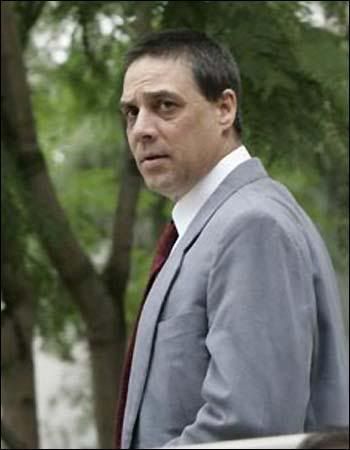
Christian Brando Invokes Fifth Amendment at Blake Civil Trial
http://abclocal.go.com/kabc/story?section=local&id=3573701
BURBANK - Marlon Brando's son, a key figure in the wrongful death case of his former lover and Robert Blake's wife, refused to answer questions in court Tuesday.
Christian Brando's lawyer stood next to the witness box and repeatedly invoked the Fifth Amendment on behalf of his client to protect him from possible self-incrimination.
Blake's lawyers have pointed at Brando as a possible suspect in the slaying of Blake's wife, Bonny Lee Bakley. Brando, 46, has not been arrested or charged.
Blake is being sued for wrongful death by the family of Bakley. The star of the old "Baretta" TV show was found not guilty of murder in a criminal trial that ended earlier this year.
On the witness stand, Brando answered only a few questions, giving his name and birth date and identifying his voice on two tape recordings of phone conversations with Bakley.
"At any time did you meet an individual named Bonny Bakley?" Blake attorney Peter Ezzell asked.
"Yes," said Brando, who then invoked the Fifth Amendment when asked for more details of their relationship.
"Did you become aware that Bonny Bakley had taped her conversations with you?" Ezzell asked.
"No," Brando said.
The tapes, which have been played publicly before, include discussions in which Brando expresses exasperation with Bakley, who was claiming at one point that the baby she was carrying was fathered by Brando.
The child belonged to Blake.
Blake's attorney then played brief snippets from the tapes, and Brando said it was his voice along with Bakley's. He refused to answer a question about his comment on the tape telling Bakley: "You're lucky somebody ain't out there to put a bullet in your head."
He also declined to answer questions about whether he hired someone to kill Bakley, if she told him she feared Blake was going to kill her, or if she offered Brando sex with her 17-year old daughter.
Superior Court Judge David M. Schacter allowed Brando to invoke the Fifth Amendment on certain questions but not on others.
Brando did testify that he had served five years in prison for manslaughter in the death of his sister's boyfriend, Dag Drollet.
As he left the courthouse, Brando was asked whether he had any idea who may have killed Bakley. He shrugged, smiled and said, "probably sitting up in the room there," an apparent reference to the courtroom.
His lawyer, Bruce Margolin, said Brando invoked Fifth Amendment protection because "he didn't want to take part in this charade that somehow implies he's involved in this matter. ... He would prefer to have nothing to do with this matter."
After hearing the limited testimony from Brando, jurors in the civil trial left on a bus trip to Vitello's restaurant, where Blake and his wife dined the night she was shot to death.
Blake contends that wife Bonny Lee Bakley was shot when he left her in his car to go back inside a restaurant to retrieve a handgun that he carried for protection but had accidentally left in the booth where they dined.
Blake did not testify during the criminal trial but spent seven days on the witness stand in the civil case discussing his relationship with Bakley and other matters.
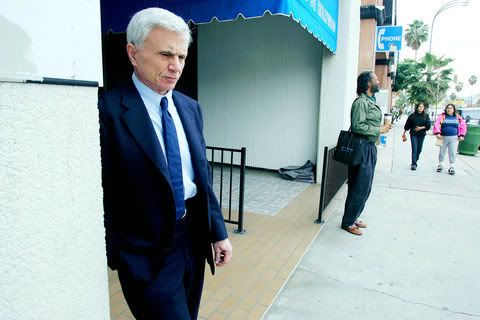
Robert Blake Ordered to Pay $30 Million
http://crime.about.com/b/a/220321.htm
A jury in a civil trial found actor Robert Blake liable in the May 2001 death of his wife Bonnie Lee Bakley and ordered the former television cop show star to pay her children $30 million in damages.
After eight days of deliberations, ten of the 12 jurors agreed that Blake, who was acquitted of criminal charges in the case, decided to get rid of Bakley so that he could raise their daughter Rosie by himself.
"These kids lost their mom, and that got overlooked over the years," said Eric Dubin, the attorney for the children. "This was a real family. This was a real person. And to have that validated in a court of law means an awful lot to these kids."
Bakley, 44, was shot to death on May 4, 2001, as she sat in Blake's sports car in an alley behind the Los Angeles-area restaurant where the couple had just dined.
In May, a jury of seven women and five men deliberated for more than 36 hours before returning a verdict of not guilty in the murder of his wife and not guilty on one count of soliciting someone to murder her. The jury deadlocked on a second solicitation charge.
Blake, former star of the television show "Baretta," did not testify in the criminal trial but took the stand in the civil case and denied the charges that he was responsible for Bakley's death.
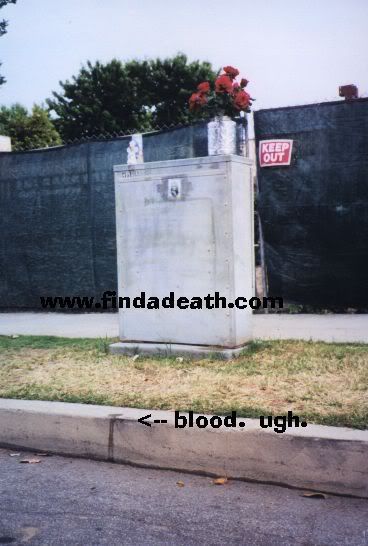
Judge Rejects Retrial for Robert Blake
http://crime.about.com/b/a/256874.htm
Superior Court Judge David Schacter had denied a motion from actor Robert Blake for a new trial in the wrongful death civil lawsuit in which a jury awarded members of Bonnie Lee Bakley's family $30 million in damages.
Blake's attorney, M. Gerald Schwartzbach, argued in the motion that the jury verdict was tainted because of numerous acts of juror misconduct, including one juror's failure to disclose that her daughter was in prison on a murder conviction.
"I'm frankly shocked by the ruling given the record before the court of egregious misconduct," Schwartzbach said. He plans to appeal the ruling.
"The children of Bonny Lee Bakley found justice for their mother's killing, and no reason ever existed to disturb this jury's verdict," said Eric Dubin, an attorney for Bakley's family.
Civil Trial Verdict Appeal
http://en.wikipedia.org/wiki/Robert_Blake_(actor)
According to the Associated Press, M. Gerald Schwartzbach filed the appeal brief on February 28, 2007.It was also reported in the AP article that an LAPD Internal Affairs investigation has been opened regarding the lead detective in the original murder case, Detective Ron Ito. The complaint was filed by M. Gerald Schwartzbach and civil trial witness Brian Allan Fiebelkorn. The complaint alleges that the detective failed to investigate leads that persons other than Robert Blake could have been responsible for the murder of Bonnie Lee Bakley. Fiebelkorn testified that associates of Christian Brando (originally claimed to have been the father of Bonnie Lee Bakley's daughter) may have been responsible for the murder of Ms. Bakley. The defense theory of who may have been involved in the conspiracy to kill Bonnie Lee Bakley was laid out in a defense motion filed during the criminal trial proceedings.
Post Acquittal
Following filing for bankruptcy, Blake has gotten a job as a ranch hand. He has moved into a small apartment and hopes to return to acting. His young daughter, Rosie, has been adopted by his older daughter.
Blake Detectives Ignored Other Suspects
http://crime.about.com/b/a/144107.htm
Robert Blake's attorney attempted to show that detectives investigating the death of Bonny Lee Bakley focused only on evidence pointing to the actor, while ignoring hundreds of letters from victims of her mail order sex scam. Defense attorney M. Gerald Schwartzbach, while cross-examining the lead detective in the case, produced nine thick folders crammed with letters from victims of Bakley's con game that were not seized by police investigating her murder.
LAPD commander who pushed 'cold case' unit dies at 58
http://www.mercurynews.com/news/ci_5795594

LOS ANGELES- Retired police Cmdr. Jim Tatreau, who pushed for a cold case unit using DNA and fingerprint database technology to re-examine thousands of forgotten murder cases, has died. He was 58.
The LAPD veteran, who rose from patrolman to head of the department's elite Robbery-Homicide Division, died at his home Sunday, two years after he was diagnosed with brain cancer, his son Jim Tatreau Jr. said.
Tatreau, a Southern California native, was a fierce advocate for those under his command. Detective Ronald Y. Ito, lead investigator on the high-profile Robert Blake murder case, said Tatreau supported a thorough inquiry.
"He supported our theories of a case, but he also wanted us to check out every aspect of it," Ito said.
Blake was acquitted in the criminal case, but was held liable for the death of wife Bonnie Lee Bakley in the civil trial.
Tatreau, who sat on hundreds of disciplinary board of rights hearing, often advocated for second chances.
"Jim had a soft spot for the underdog, for the 'strays' as he called them," said his sister Terri Tatreau, a retired LAPD sergeant. "If you were being run out of town, Jim would step out in front and turn it into your parade."
Tatreau's legacy, however, was the cold case unit. Detectives tried to create a centralized unit in 2001, but it was Tatreau who cut through the bureaucracy and got the unit formed.
"He thought it was negligent to not make use of technological advances
to solve cases, many of which had been gathering dust for decades," Detective Rick Jackson said. "That's why he fought so hard for our unit's creation, when it looked like it might not get off the ground."
Since its inception, the unit has solved nearly 50 homicide cases dating back half a century.
Tatreau is survived by his wife Tammy; sons Lt. Jim Tatreau Jr. of the Los Angeles County Sheriff's Department and Officer Scott Tatreau of the Mesa, Ariz. Police Department; and daughters Tiffany and Tatum.
A memorial service was planned for May 9 at the Police Academy
ROBERT BLAKE
The More You Know - Bonnie Lee Bakley
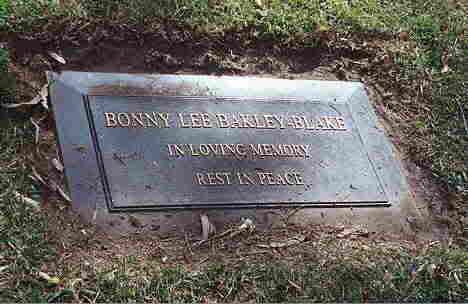
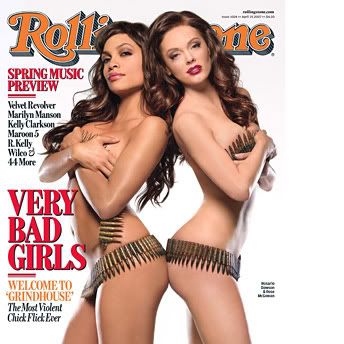











![Brotherhood" (2006) [TV-Series]](http://photos1.blogger.com/x/blogger2/1421/379621144723082/211/z/425926/gse_multipart33129.jpg)







No comments:
Post a Comment